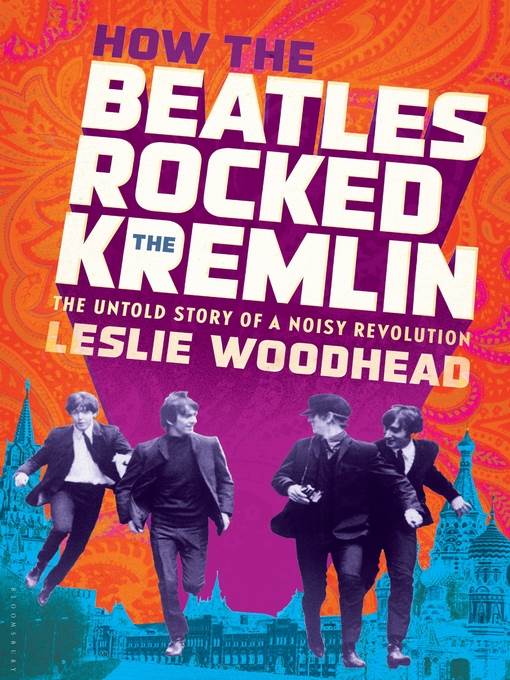
How the Beatles Rocked the Kremlin
The Untold Story of a Noisy Revolution
کتاب های مرتبط
- اطلاعات
- نقد و بررسی
- دیدگاه کاربران
نقد و بررسی

December 24, 2012
In May 2003, Paul McCartney rocked Moscow’s Red Square with the strains of “Back in the U.S.S.R.,” bringing the Beatles’ music to Russia. (The Fab Four had never been allowed to set foot in the Soviet Union.) According to Woodhead, who made the first film of the Beatles at the Cavern Club in Liverpool in 1962, the Beatles helped overthrow the Soviet Union despite never stepping on its soil. In a surprisingly dry narrative, he interviews numerous Russian fans of the group who insist that “Beatlemania washed away the foundations of Soviet society and helped a generation of free people to grow up in the Soviet Union.” Woodhead chats with Russian defense minister Sergei Ivanov, who tells him, “The Party said that the Beatles were a negative influence. But propaganda was one thing, and real life was totally different.... I really began to learn English through Beatles lyrics”; by listening to “A Day in the Life,” for example, Ivanov learns what the word “comb” means. Kolya Vasin tells Woodhead, “John Lennon’s songs are like folks songs for us since John Lennon is pain and Russia is full of pain.” These and many other stories confirm for Woodhead that the Beatles’ music revealed the cracks “in the utopian Soviet project and its dream of making a new society,” fostering a loss of faith in the Soviet project and encouraging a newfound faith in the freedom and utopia promised by the Beatles’ music.

January 15, 2013
An exhaustive and exhausting look at the Fab Four's impact on the Soviet Union. British documentarian Woodhead (My Life as a Spy, 2005, etc.) was on the Beatles' story early: He shot historic footage of the band at Liverpool's Cavern Club in 1962. Also a minor Cold War-era spy, the author spent more than three decades researching the group's impact on the Soviet psyche. His early chapters recount the Stalin regime's ambivalent, ultimately repressive relationship with jazz; saxophones were actually banned by the despot. The rise of the Beatles led to a vast underground market for the Beatles' music behind the Iron Curtain: Fans etched the quartet's banned music on X-ray film, traded clandestine reel-to-reel tapes and fashioned electric guitars with parts from gutted pay phones. Woodhead charts the rise of the Soviet Union's rock underground via interviews with Russian rockers and delineates the people's mania for the Beatles through conversations with promoters and an obsessive collector, Kolya Vasin. The band became an aboveground presence after the collapse of Communism, as Mikhail Gorbachev's regime embraced the group; a highlight is a detailed account of an emotionally charged 2008 Paul McCartney concert in Kiev. There's other fine on-the-ground reporting here, as Woodhead looks in on a show by a Beatles-punk band, a John Lennon birthday salute and a Russian recreation of the Cavern. However, by the later pages, the testimony about the social, cultural and political changes wrought from Moscow to Minsk by the group's music becomes repetitive. By the midpoint, readers well understand that the Beatles' tuneful message of life, love and freedom helped engender a liberated mindset that in some ways facilitated the toppling of the communist state. But Woodhead wears out his point by hammering it home relentlessly. An imperfect but worthwhile addition to the Beatles bookshelf.
COPYRIGHT(2013) Kirkus Reviews, ALL RIGHTS RESERVED.

March 1, 2013
Who really tore down the Iron Curtain? British documentarian Woodhead suggests it may have been John, Paul, George, and Ringo. Woodhead was a young researcher when he led a Liverpool TV crew into the Cavern Club to film the Beatles for the first time. He had eavesdropped on Soviet and East German pilots from West Germany during 1950s military service, so when Gorbachev's liberalization brought Soviet tourists west who proclaimed the Beatles had freed their minds, Woodhead wanted to know more. This book is the product of many trips to the USSR and, later, Russia, Ukraine, and Belarus, and encounters and interviews with people, young and old, in the mainstream and far outside it, all of whom viewed the Beatles as their saviors. In a USSR ruled by fear and belief, contemporaries told Woodhead, the Beatles dissolved their fear and undermined their political faith. Sadly, this celebration of the joy and freedom the Beatles brought to the Khrushchev-era USSR closes with Woodhead's Russian friends organizing against the 2012 prosecution of Pussy Riot for all-too-familiar cultural crimes. (Reprinted with permission of Booklist, copyright 2013, American Library Association.)

























دیدگاه کاربران